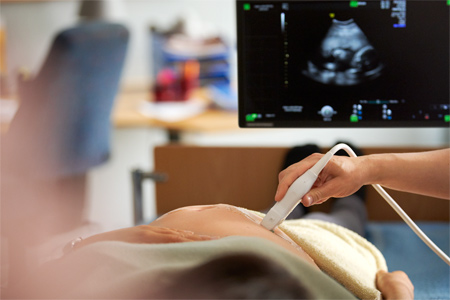Harmful diseases while pregnant
Most bacteria and viruses can’t harm the baby in your belly, and thankfully, infections that are dangerous during pregnancy are rare. But there are some exceptions of which it may be good to be aware.
What diseases are dangerous while pregnant?
During pregnancy, your immune system is slightly suppressed. Most sicknesses you might catch are harmless, though it might take longer than usual to recover. But a few – such as rubella, toxoplasmosis, listeriosis, herpes and group B strep (GBS) – can be harmful for the baby during pregnancy or childbirth.
Rubella
Rubella is a very rare viral infection. If you are infected during your first trimester and you have not been vaccinated or had rubella before, it is common for it to affect the baby in various ways. It often leads to miscarriage or to defects of the brain, eyes, ears or heart.
Even though rubella is now rare in many places, vaccination is recommended if you weren’t vaccinated as a child, or if you haven’t had the disease. If you’re unsure, your doctor or midwife can check for antibodies when you go in for a check-up.
Toxoplasmosis and listeria
There are two illnesses that you can get through food that could be harmful to the development of the foetus, or lead to miscarriage in the worst case: listeriosis and toxoplasmosis. The risk of infection is small and by following the list of foods to avoid while pregnant, you can minimise it even more.
Herpes
Herpes is another disease to be extra cautious about during pregnancy. The herpes virus presents as sores around the mouth or genitals and it can infect the baby during childbirth. If you have herpes-like symptoms during pregnancy, the sores will be tested to determine whether they are herpes. If so, an antiviral medication will be prescribed to avoid the risk of transmitting the disease to the baby, because the herpes virus can produce serious symptoms in newborns. If you have a severe herpes outbreak when childbirth is approaching, you will be given antivirals to avoid infecting the baby during the birth. Sometimes, despite having medication, it may be appropriate to have a C-section just to be on the safe side.
Group B Streptococcus
Group B Streptococcus, or GBS, is a broad group of bacteria. Many people have this kind of bacteria in their gut without infection or any symptoms. But in rare cases, they can spread to the genitals and present problems during pregnancy. The most common issue GBS causes is a urinary tract infection in the pregnant person – which can result in premature birth, but the bacteria can also lead to severe illness in the baby.
You would not usually be tested to diagnose group B strep during pregnancy if you have no symptoms of a urinary tract infection. If you have had such an infection before, or if you tend to get urinary tract infections, a urine sample or culture sample from the vagina and rectum will be taken. If the sample confirms GBS, you will start taking antibiotics during the pregnancy and childbirth. After that, both you and the newborn baby will be monitored – which means you might have to stay in the postnatal ward for a few extra days.
Other serious illnesses during pregnancy
There are some other ailments that can affect pregnant people. Gestational diabetes and preeclampsia. These are both due to an imbalance in the body during pregnancy and will be monitored by the doctor or midwife when you go in for checkups.
Please note that all information above is based on Swedish recommendations.



